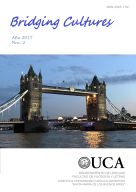Por favor, use este identificador para citar o enlazar este ítem:
https://repositorio.uca.edu.ar/handle/123456789/4416| Campo DC | Valor | Lengua/Idioma |
|---|---|---|
| dc.contributor.author | Bize, Daniela | es |
| dc.date.accessioned | 2019-06-01T18:32:32Z | - |
| dc.date.available | 2019-06-01T18:32:32Z | - |
| dc.date.issued | 2017 | - |
| dc.identifier.citation | Bize, Daniela. “A multicultural approach to english teaching in Buenos Aires : is it happening?” [en línea]. Bridging Cultures, 2 (2017). Disponible en: https://repositorio.uca.edu.ar/handle/123456789/4416 | es |
| dc.identifier.issn | 2525-1791 | - |
| dc.identifier.uri | https://repositorio.uca.edu.ar/handle/123456789/4416 | - |
| dc.description.abstract | Abstract: Multilingualism is an old phenomenon which has become a central issue for language teaching professionals in recent years as the world we live in becomes increasingly globalized. While in Buenos Aires the importance of a multicultural and multilingual approach to the teaching of English is acknowledged in official documents such as the Curricular Design for Foreign Languages (Diseño Curricular de Lenguas Extranjeras), the question remains whether this translates into concrete teaching practices or education policies; especially when Native American languages such as Quechua or Aymara are involved. As an attempt to start replying to this question, we chose to work on school districts 13 and 20, where there is a high percentage of Bolivian population. Fifty primary school English teachers were interviewed between November and December of 2014. This article analyses part of the results of these interviews, focusing on three conclusions. Firstly, most teachers do not regard multilingualism as an important component of their classes, which is reflected by their lack of knowledge of their students’ linguistic background. Secondly, teaching practices are only incidentally affected by multicultural environments. Finally, training offered on these issues by the Ministry of Education is scarce and does not reach teachers, who are mostly unaware of its existence and, therefore, do not participate in it. | es |
| dc.description.abstract | Resumen: El multilingualismo es un fenómeno antiguo que ha cobrado nuevo protagonismo para los profesionales de la enseñanza de la lengua, a medida que el mundo en el que vivimos se torna cada vez más globalizado. A pesar de que en Buenos Aires la importancia de un enfoque multicultural y multilingüe para la enseñanza del inglés encuentra reconocimiento en documentos oficiales como el Diseño Curricular de Lenguas Extranjeras, todavía se desconoce si esto se traduce en prácticas docentes concretas o en políticas educativas; especialmente cuando se trata de lenguas originarias como el Quechua o el Aymara. En un intento de comenzar a responder este interrogante, decidimos trabajar con escuelas de los distritos escolares 13 y 20, en donde hay un alto porcentaje de población boliviana. Cincuenta profesores de inglés de escuelas primarias fueron entrevistados entre noviembre y diciembre de 2014. Este artículo presenta parte de los resultados de estas entrevistas, poniendo el énfasis en tres conclusiones. En primer lugar, la mayoría de los docentes no consideran el multilingualismo como un componente importante de sus clases, lo que se refleja en su falta de conocimiento sobre el repertorio lingüístico de sus estudiantes. En segundo lugar, las prácticas docentes solo se ven incidentalmente afectadas por los entornos multiculturales. Finalmente, la oferta de capacitación sobre estas cuestiones por parte del Ministerio de Educación es escasa y no alcanza a la población docente, que la desconoce y, por lo tanto, no participa de ella. | es |
| dc.format | application/pdf | es |
| dc.language.iso | eng | es |
| dc.publisher | Universidad Católica Argentina. Facultad de Filosofía y Letras | es |
| dc.rights | Acceso Abierto | es |
| dc.rights.uri | https://creativecommons.org/licenses/by-nc-sa/4.0/ | es |
| dc.source | Bridging Cultures Nº 2, 2017 | es |
| dc.subject | ENSEÑANZA DEL INGLES | es |
| dc.subject | ENSEÑANZA DE IDIOMAS | es |
| dc.subject | MULTILINGÜISMO | es |
| dc.subject | DOCENTES | es |
| dc.title | A multicultural approach to english teaching in Buenos Aires : is it happenning? | es |
| dc.type | Artículo | es |
| uca.path | Bridging Cultures|2017 nº 02 | es |
| uca.disciplina | LENGUA | es |
| uca.filename | /home/data-uca-generic/folder_generic/bridging-cultures2/multicultural-approach-english-teaching/metadata.xml | es |
| uca.issnrd | 1 | es |
| uca.affiliation | Fil: Bize, Daniela. Pontificia Universidad Católica Argentina; Argentina | es |
| uca.orden | 03 | es |
| uca.version | publishedVersion | es |
| item.fulltext | With Fulltext | - |
| item.grantfulltext | open | - |
| item.languageiso639-1 | en | - |
| Aparece en las colecciones: | BC - 2017 nro. 02 | |
Ficheros en este ítem:
| Fichero | Descripción | Tamaño | Formato | |
|---|---|---|---|---|
| multicultural-approach-english-teaching.pdf | 1,24 MB | Adobe PDF |  Visualizar/Abrir |
Visualizaciones de página(s)
110
comprobado en 30-abr-2024
Descarga(s)
193
comprobado en 30-abr-2024
Google ScholarTM
Ver en Google Scholar
Este ítem está sujeto a una Licencia Creative Commons

